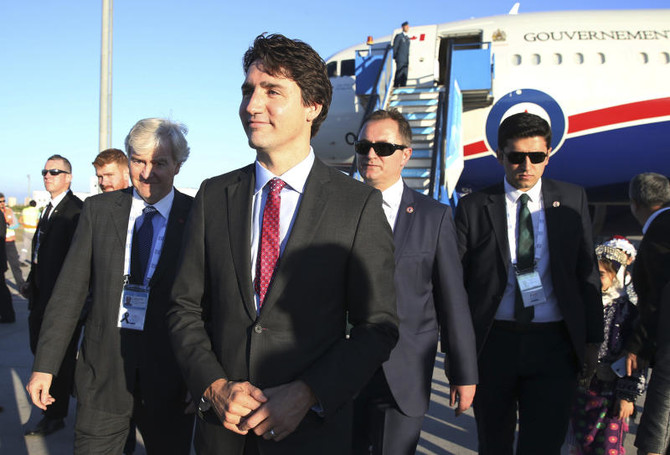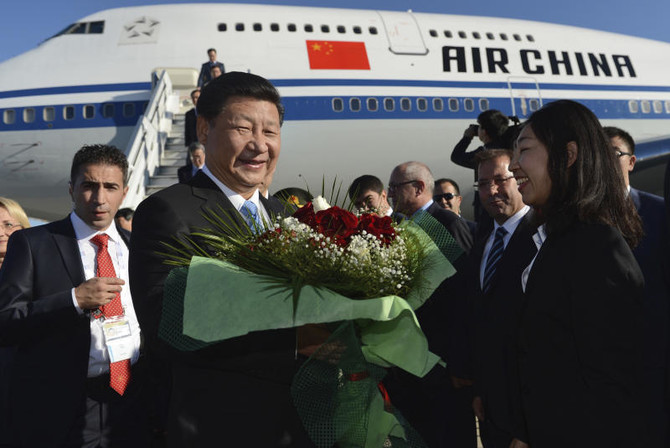ANTALYA, Turkey: World leaders converged Sunday for a summit in Turkey to send a message of unity in the face of the Paris attacks but confronting a gaping divide over the multiple conflicts tearing Syria apart.
Custodian of the Two Holy Mosques King Salman, US President Barack Obama, Chinese President Xi Jinping and Vladimir Putin of Russia will join other leaders in the southern Mediterranean resort of Antalya less than two days after the attacks claimed by Daesh jihadists killed at least 129 people and sent shockwaves across the world.
The character of this Group of 20 summit has been transformed by the attacks, with security and the Syrian conflict now eclipsing a traditionally financial agenda that must also deal with the spreading refugee crisis, climate change and tax avoidance.
An official in the French delegation, led by Foreign Minister Laurent Fabius after President Francois Hollande stayed home to lead his shaken nation, said it was expected that during the meetings “there would a particular emphasis on terrorism.”
The gathering offers the first possibility of a meeting between Obama and Putin since Russia launched its declared anti-Daesh air campaign in Syria, which the West suspects is aimed at propping up the regime of President Bashar Assad.
The White House has said there may be an informal meeting between the pair, whose icy body language at previous encounters has grabbed as many headlines as their comments. No formal summit is scheduled, however.
Host President Recep Tayyip Erdogan, who wants to use the summit to cement his status as a global leader after a resounding election victory this month, has called on the world to forge a stronger “consensus” on terror in the wake of the attacks.
But whereas even the likes of Putin and Obama will have no trouble standing together in shared abhorrence of terrorism, overcoming differences on Syria will prove far trickier.
Finding common ground
All musical events, including at the official dinner on Sunday night, have been canceled as a mark of respect for the victims of the Paris attacks for the summit, which officially kicks off at midday Sunday (1000 GMT), Turkish presidential sources said.
The leaders will likely struggle to find common ground over the Syria crisis, with hosts Turkey deeply opposed to Russia’s air strikes and finding only a lukewarm reaction so far to its proposal for a safe zone free of Daesh jihadists to be created inside Syria as a haven for refugees.
“I pray and hope that G20 will provide a platform whereby all of these issues can be discussed openly and then we can understand each other,” Erdogan said ahead of the summit.
Top diplomats gathered in Vienna on Saturday agreed a fixed calendar for Syria that would see a transition government in six months and elections in 18 months but failed to agree on the future of Assad.
Yet officials in Antalya have also insisted that they will not allow those behind the Paris attacks to derail the summit from achieving its original aims.
The refugee crisis is a key topic, with host Turkey housing some 2.2 million Syrian refugees from the conflict but the European Union wanting Ankara to do more to prevent migrants undertaking risky boat crossings to the EU.
Discussions on climate change will assume greater importance than usual coming just ahead of the UN COP21 conference in Paris that aims to agree a legally binding global climate treaty.
Campaigners will be hoping that a change of leadership in Canada and Australia — whose previous premiers had shown skepticism about the climate drive — will help encourage progress.


World leaders convene to condemn Paris terror, narrow Syria divide
World leaders convene to condemn Paris terror, narrow Syria divide

Israel says Netanyahu will meet with Trump on Wednesday about Iran talks

- Israeli Prime Minister Benjamin Netanyahu will meet with US President Donald Trump in Washington on Wednesday about the US talks with Iran
JERUSALEM: Israeli Prime Minister Benjamin Netanyahu will meet with US President Donald Trump in Washington on Wednesday about American talks with Iran, his office said Saturday, while Iran’s foreign minister threatened US military bases in the region a day after the discussions.
“The prime minister believes that all negotiations must include limiting the ballistic missiles, and ending support for the Iranian axis,” Netanyahu’s office said in a brief statement, referring to Tehran’s support for militant groups, including Hezbollah in Lebanon and Hamas in the Palestinian territories. Trump and Netanyahu last met in December.
There was no immediate White House comment.
The US and the Islamic Republic of Iran held indirect talks on Friday in Oman that appeared to return to the starting point on how to approach discussions over Tehran’s nuclear program.
Trump called the talks “very good” and said more were planned for early next week. Washington was represented by Middle East special envoy Steve Witkoff and Jared Kushner, Trump’s son-in-law.
Trump has repeatedly threatened to use force to compel Iran to reach a deal on its nuclear program after sending the aircraft carrier USS Abraham Lincoln and other warships to the region amid Tehran’s crackdown on nationwide protests that killed thousands.
Gulf Arab nations fear an attack could spark a regional war, with memories fresh of the 12-day Israel-Iran war in June.
For the first time in negotiations with Iran, the US on Friday brought its top military commander in the Middle East to the table. US Navy Adm. Brad Cooper, head of the military’s Central Command, then visited the USS Abraham Lincoln on Saturday with Witkoff and Kushner, the command said in a statement.
Iranian Foreign Minister Abbas Araghchi told journalists Friday that “nuclear talks and the resolution of the main issues must take place in a calm atmosphere, without tension and without threats.” He said that diplomats would return to their capitals, signaling that this round of negotiations was over.
On Saturday, Araghchi told the Al Jazeera satellite news network that if the US attacks Iran, his country doesn’t have the ability to strike the US “and therefore has to attack or retaliate against US bases in the region.”
He said there is “very, very deep distrust” after what happened during the previous talks, when the US bombed Iranian nuclear sites during last year’s Israel-Iran war.
Araghchi also said the “missile issue” and other defense matters are “in no way negotiable, neither now nor at any time in the future.”
Tehran has maintained that these talks will be only on its nuclear program.
However, Al Jazeera reported that diplomats from Egypt, Turkiye and Qatar offered Iran a proposal in which Tehran would halt enrichment for three years, send its highly enriched uranium out of the country and pledge to “not initiate the use of ballistic missiles.”
US Secretary of State Marco Rubio said Wednesday that the talks needed to include all those issues.
Israel, a close US ally, believes Iran is pursuing a nuclear weapon and wants its program scrapped, though Iran has insisted that its atomic plans are for peaceful purposes. Israel also wants a halt to Iran’s ballistic missile program and its support for militant groups in the region.
Araghchi, speaking at a forum in Qatar on Saturday, accused Israel of destabilizing the region, saying that it “breaches sovereignties, it assassinates official dignitaries, it conducts terrorist operations, it expands its reach in multiple theaters.” He criticized Israel’s treatment of Palestinians and called for “comprehensive and targeted sanctions against Israel, including an immediate arms embargo.”
“The prime minister believes that all negotiations must include limiting the ballistic missiles, and ending support for the Iranian axis,” Netanyahu’s office said in a brief statement, referring to Tehran’s support for militant groups, including Hezbollah in Lebanon and Hamas in the Palestinian territories. Trump and Netanyahu last met in December.
There was no immediate White House comment.
The US and the Islamic Republic of Iran held indirect talks on Friday in Oman that appeared to return to the starting point on how to approach discussions over Tehran’s nuclear program.
Trump called the talks “very good” and said more were planned for early next week. Washington was represented by Middle East special envoy Steve Witkoff and Jared Kushner, Trump’s son-in-law.
Trump has repeatedly threatened to use force to compel Iran to reach a deal on its nuclear program after sending the aircraft carrier USS Abraham Lincoln and other warships to the region amid Tehran’s crackdown on nationwide protests that killed thousands.
Gulf Arab nations fear an attack could spark a regional war, with memories fresh of the 12-day Israel-Iran war in June.
For the first time in negotiations with Iran, the US on Friday brought its top military commander in the Middle East to the table. US Navy Adm. Brad Cooper, head of the military’s Central Command, then visited the USS Abraham Lincoln on Saturday with Witkoff and Kushner, the command said in a statement.
Iranian Foreign Minister Abbas Araghchi told journalists Friday that “nuclear talks and the resolution of the main issues must take place in a calm atmosphere, without tension and without threats.” He said that diplomats would return to their capitals, signaling that this round of negotiations was over.
On Saturday, Araghchi told the Al Jazeera satellite news network that if the US attacks Iran, his country doesn’t have the ability to strike the US “and therefore has to attack or retaliate against US bases in the region.”
He said there is “very, very deep distrust” after what happened during the previous talks, when the US bombed Iranian nuclear sites during last year’s Israel-Iran war.
Araghchi also said the “missile issue” and other defense matters are “in no way negotiable, neither now nor at any time in the future.”
Tehran has maintained that these talks will be only on its nuclear program.
However, Al Jazeera reported that diplomats from Egypt, Turkiye and Qatar offered Iran a proposal in which Tehran would halt enrichment for three years, send its highly enriched uranium out of the country and pledge to “not initiate the use of ballistic missiles.”
US Secretary of State Marco Rubio said Wednesday that the talks needed to include all those issues.
Israel, a close US ally, believes Iran is pursuing a nuclear weapon and wants its program scrapped, though Iran has insisted that its atomic plans are for peaceful purposes. Israel also wants a halt to Iran’s ballistic missile program and its support for militant groups in the region.
Araghchi, speaking at a forum in Qatar on Saturday, accused Israel of destabilizing the region, saying that it “breaches sovereignties, it assassinates official dignitaries, it conducts terrorist operations, it expands its reach in multiple theaters.” He criticized Israel’s treatment of Palestinians and called for “comprehensive and targeted sanctions against Israel, including an immediate arms embargo.”
© 2026 SAUDI RESEARCH & PUBLISHING COMPANY, All Rights Reserved And subject to Terms of Use Agreement.











